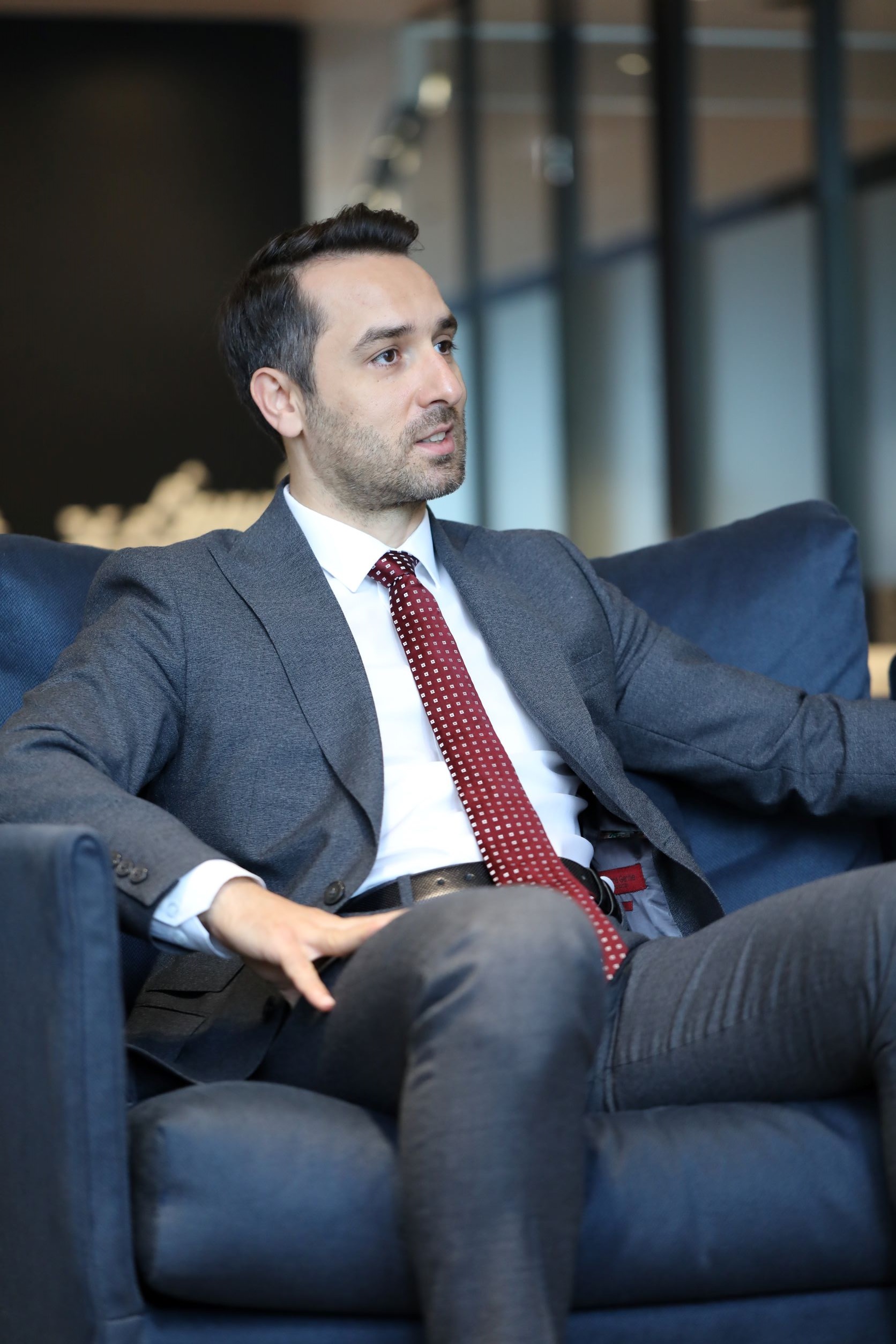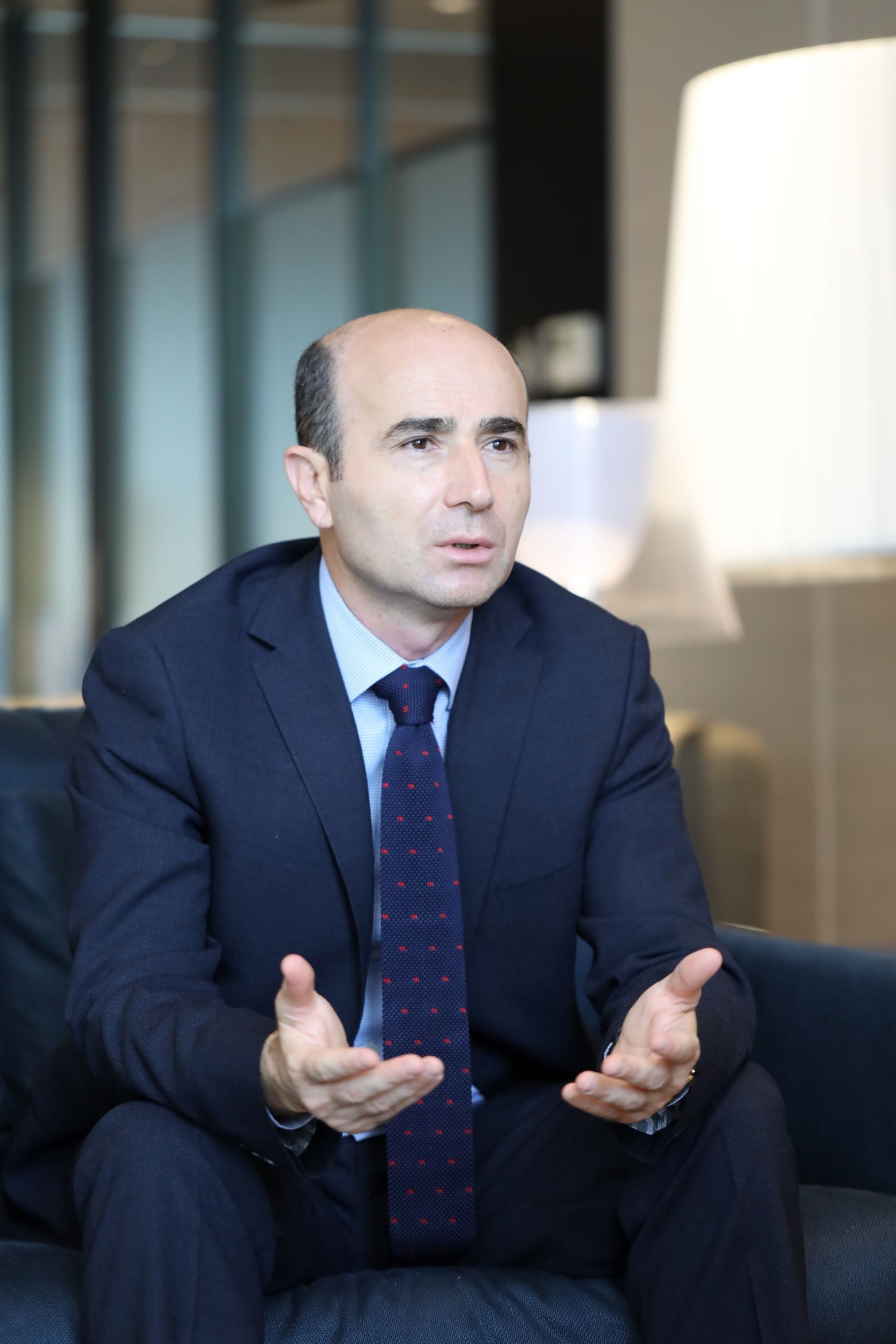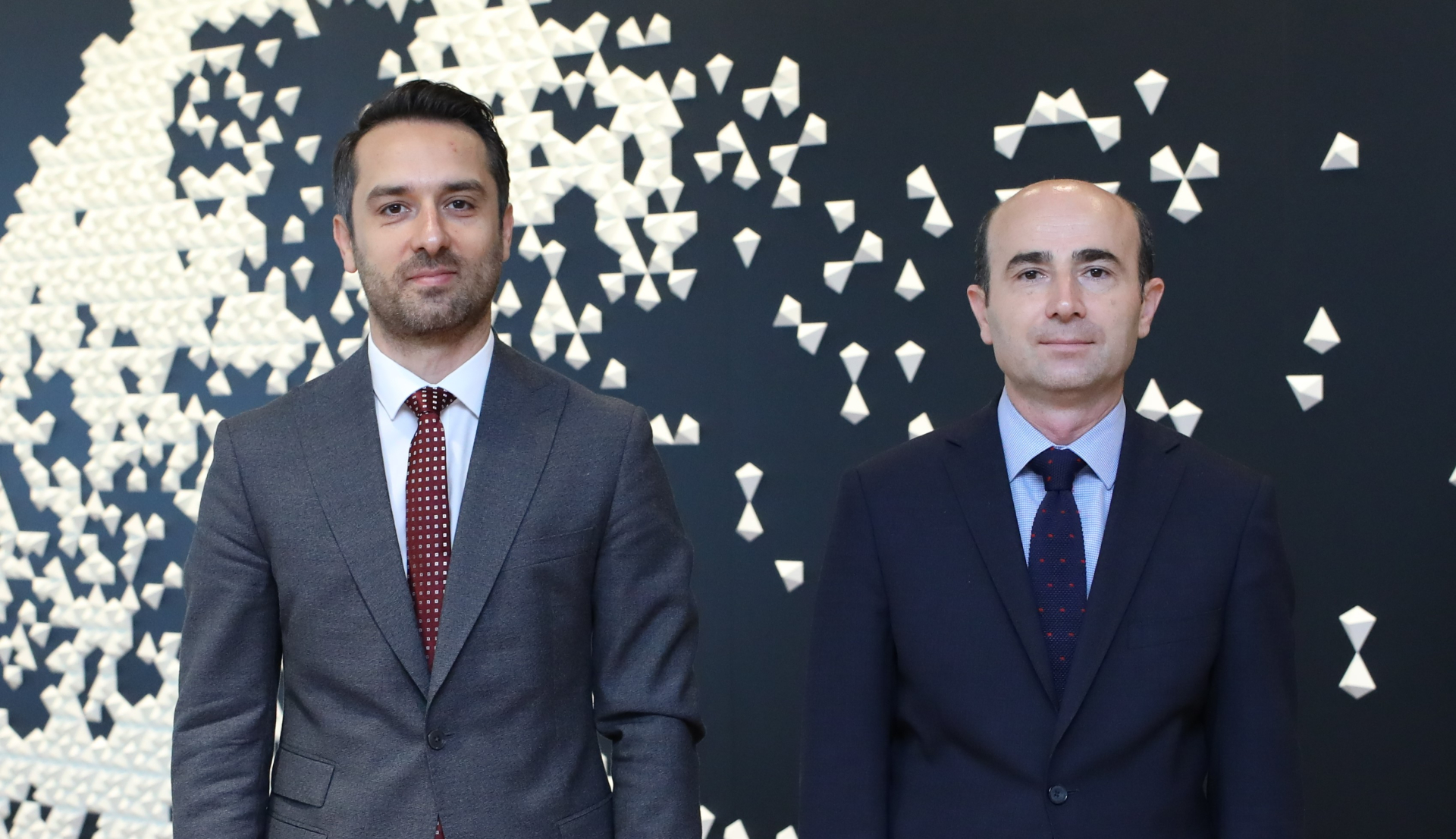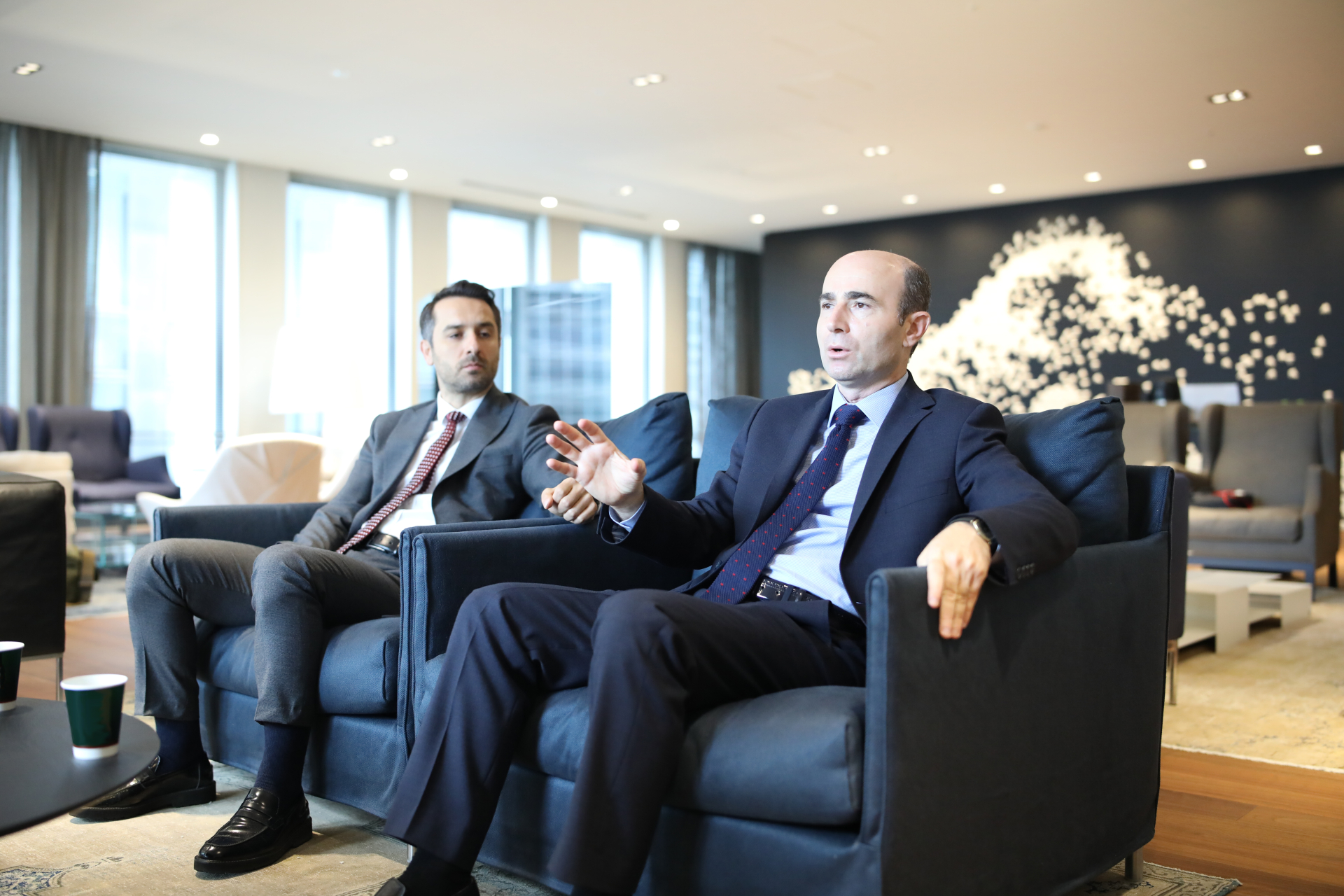On September 29, 2022, the Asia and Middle East Program of the Sasakawa Peace Foundation (SPF) welcomed Dr. Ufuk Ulutaş, Chairman of the Center for Strategic Research at the Ministry of Foreign Affairs of the Republic of Türkiye, and Dr. Mesut Özcan, director of Diplomacy Academy at the Ministry of Foreign Affairs of the Republic of Türkiye, for an
event looking at Turkish foreign policy in light of Russia’s invasion of Ukraine. Following this event, Dr. Ulutaş and Dr. Özcan sat down with SPF to discuss the unique position of Türkiye within the Ukraine conflict as well as Türkiye's potential role in reaching a diplomatic solution. In addition, they assessed current Japan-Türkiye relations and explored possible areas to deepen this partnership, including potential cooperation on defense issues. Excerpts haves been lightly edited for length and clarity.
Could you begin by explaining the Turkish position regarding the Ukraine conflict?
Dr. Ulutaş: The key word is "balanced." We have been quite clear that this is an unprovoked war, and Russia has been occupying Ukrainian land. In order to reach a peace deal, this occupation should stop. That is why Türkiye has been giving technical support and political support to Ukraine since the beginning of the conflict.
At the same time, Türkiye has been advocating that there should be doors open for dialogue with Russia. This is the nuanced understanding of Türkiye with regard to the current conflict between Ukraine and Russia. While supporting Ukraine, we are also talking with Russia. This is probably why Türkiye has been an instrumental country bringing both actors to the negotiation table more than once in Türkiye, the first time in Antalya and then in Istanbul, which made two major deals — one regarding grain and the other regarding the exchange of prisoners — possible.
Türkiye’s diplomatic activity has been very intense since the beginning of the conflict. Both President Erdogan and Foreign Minister Çavuşoğlu have been working very closely with their counterparts in both countries to find a middle ground. We have been balanced since day one, and we have been prioritizing diplomacy since day one.
Dr. Özcan: This policy is dictated by Turkish geography. Both Ukraine and Russia are our neighbors, and we are not a distant country from this conflict. For this reason, we have been following the developments on the ground very closely, and we must balance and calibrate our position according to this reality. We have strong economic, cultural, and political ties with both countries. Considering these factors, it is only natural for Türkiye to pursue its own policy.
Türkiye has been against this invasion from day one and has stated many times that the peace should include protecting the territorial integrity and sovereignty of Ukraine. On the other hand, we have economic ties, energy issues, and cultural issues with Russia. At the end of the day, the conflict will come to an end via diplomacy, but in order to find a settlement to reach an armistice or a ceasefire, there needs to be some sort of channel between the two sides. Türkiye is trying to contribute to the end of this conflict by its own means, including ongoing talks between Turkish officials, Ukrainian officials, and Russian officials.
What are the concrete steps that need to happen to first reach a ceasefire and then ultimately a larger resolution to the conflict, and what is Türkiye’s role in this process?

Dr. Ufuk Ulutaş, Chairman of Center for Strategic Research, Ministry of Foreign Affairs of the Republic of Türkiye
Dr. Ulutaş: First, there needs to be silence on the ground to open the doors of dialogue. Then, to ensure the territorial integrity of Ukraine, the occupation should be addressed. This includes not only areas in eastern Ukraine, but also the previous Russian occupation of the Crimean Peninsula.
In this process, Türkiye will act as a facilitator or mediator searching for common ground between the two parties. However, we and other third parties should not be in the position of imposing what the two parties should do or should accept.
The main problem is the hot conflict, and the second is the occupation. Any ceasefire or agreement should deal with these two issues. In addition, in order to secure a better future for both countries, there should be international mechanisms to assure that we are not going to see another escalation on the ground, that the borders between the two countries are safe and secure, and that the residents living in those areas will not be put into another cycle of conflict in the future.
Russian President Putin is poised to recognize the regions in the eastern region of Ukraine*, so it appears there is not common ground regarding the territorial integrity of Ukraine. What options are left for a diplomatic resolution?
Dr. Özcan: These types of referendum by Russia — not only limited to the Luhansk and Donetsk regions, but also Crimea and South Ossetia — none of these referendums are recognized by international actors. Probably this will be the same for the current developments. It’s not that easy for Ukrainian side to accept the outcomes of these referendum. For this reason, I don’t expect countries that are supporting Ukraine or are against the occupation will accept this.
What are the main arguments of Russia in terms of this war? They were thinking there were promises made to Russia after the end of the Cold War that there would be no more NATO expansion to the east. On the other hand, it is up to each independent country to decide to which organization it is going to belong.
To satisfy the expectations of both sides, there needs to be certain guarantees by international actors — countries and organizations — regarding the neutrality of Ukraine and, at the same time, the territorial integrity and sovereignty of Ukraine. As you may remember during the early days of the conflict, there were ongoing talks in Belarus and Türkiye regarding these issues. There might be some common ground here because there is precedence for these types of talks.
The main aim of Türkiye is to bring together Zelensky and Putin because they are the ones who are making the decisions. Of course there are diplomats and other bureaucrats at different levels on both sides that must come together to find a common ground, but at the end of the day, it is decided by the presidents of each country.
Turning to Japan-Türkiye relations, could you give an assessment of the current relationship and what you see as the main priorities?

Dr. Mesut Özcan, Director of Diplomacy Academy, Ministry of Foreign Affairs of the Republic of Türkiye
Dr. Özcan: Japan and Türkiye are countries that are far away from each other geographically, on the eastern and western side of Asia. In the past there were some historical moments when the two countries came together. More recently, we have seen additional economic activities, such as Japan’s investment in Türkiye in several sectors, including the construction of some big projects in Türkiye.
Because of the pandemic, there was a slowdown of relations, which happened between all countries. However, lately we have seen more exchanges between the two sides, with the economic aspects of the relationship dominating the agenda. There are also some attempts to diversify these relations in other areas like education, culture, and perhaps defense, but these are early steps.
What is the value of a deeper Japan-Türkiye relationship?
Dr. Ulutaş: I would argue that the general perception of both countries with regard to each other has been very positive. I also think that both countries are advanced in different sectors in ways that can complement each other. Technology is one example. Japan is known for its high-tech capabilities, and I would say that Türkiye is one of the rising stars in that field. There are many things that Turkish technology producers can learn from Japan, and there are other things that Türkiye can offer to Japan.
One issue that I would like to underline here is a possible future cooperation on defense issues. We are living in an age where countries want to diversify defense strategies, defense productions, capabilities, and procurements. It is not the time to procure all defense products from only one source. That is why in the recent years, coproduction has become a very popular topic among nations that want to protect and secure their borders in pursuit of peace and stability.
Coproduction is one thing that Türkiye has been very much interested in and invested in. We have been coproducing and conducting research and development with many of our allies around the world, producing very efficient products as a result of these efforts. In the defense sector, there is a long way to go between Türkiye and Japan, but I think we may see some developments in that sector especially.
One area that has been discussed is drones. This was mentioned by Foreign Minister Mevlut Cavusoglu when he recently visited Japan. Turkish drones have proven to be very efficient in combat and have been discussed not only because of the war in Ukraine, but also due to previous conflicts.
The nature of war is also changing and transforming, so drone technology and unmanned vehicles have become very popular on the ground. This not only applies during war, but also for the protection of borders and for civilian purposes as well. I don’t mean to imply that there are concrete projects yet, but there is a potential there.
What kind of presence does Türkiye hope to establish in East Asia, and how does the Japan-Türkiye relationship fit into this strategy?
Dr. Ulutaş: Türkiye has different multiple geographical identities, and Asia is one of them. We Turks came from central Asia back in the day, and we have strong connections to the Asian continent in general. That’s why the Turkish foreign ministry announced the Asia Anew Initiative, by which we are trying to deepen our ties with Asian countries. We are not seeking competition among our partners. We want these relationships to complement each other as part of a regional collaboration. This is why we took part in several regional political organizations, such as ASEAN.
In international relations, either you are in the conversation or you are out of the conversation and the conversation is going on in your absence. Türkiye, as a country that considers itself also as Asian, wants to be in the conversations in Asia. That’s why organizations like the Shanghai Cooperation Organization (SCO) or ASEAN and other regional cooperation organizations came to the fore. At the end of the day, we see them as organizations of cooperation, and we see them as tools to deepen our cooperation with Asian countries.
Dr. Özcan: To deepen relationships with Asian countries, Türkiye is becoming an observer or partner of different organizations in this part of the world. In addition, to increase contacts between the Turkish people with this part of the world, Türkiye is trying to sign several trade agreements with countries like Singapore, Malaysia, and South Korea. Talks are ongoing with Japan as well.
There are several different aspects to deepening our relationships with Asia. These include increasing contacts with counterparts and visits as well as increasing diplomatic representation is in this part of the world. For example, Türkiye has opened up embassies in all ASEAN countries.
These actions are all part of a combined strategy, not focusing on one particular issue or one particular sector. The aim is to diversify relations with Asian countries, and by doing it with all the countries as much as possible and across all sectors.
Given the many aspects of the Japan-Türkiye relationship, what are your hopes for future collaboration with SPF?
Dr. Ulutaş: We are looking to collaborate on a range of issues, including education, exchange programs, and Track 2 or Track 1.5 meetings. For us, coming together with organizations like SPF gives us an opportunity to understand what is going on in this part of Asia, and the same thing is true for SPF regarding what’s going on in the western part of Asia. Ukraine is a great example in that sense. Japan is very far away from Ukraine, but what happens in Ukraine has ramifications in this part of the world. Getting the perception and understanding of a country near the conflict is by itself very valuable for a country like Japan. On the other hand, getting into touch with the realities on the ground in this part of the world is invaluable for us, living in the western most part of Asia.
Japan and Türkiye are the frontiers of the Asian continent, and I hope we can continue to help each other to understand the developments in our surroundings, which may have global implications.
Profile of Dr. Ufuk Ulutaş
Chairman of the Center for Strategic Research, Ministry of Foreign Affairs
Dr. Ufuk Ulutaş received his B.A. in Political Science and Public Administration from Bilkent University and his M.A. in Middle Eastern History from The Ohio State University. He completed his Ph.D. in International Relations at Ankara YBU. He studied Hebrew and Middle Eastern politics at the Hebrew University of Jerusalem. He worked at the Ohio State University between 2002-2010 as a research/teaching assistant at the Department of History; as the Samuel M. Melton Fellow as well as George M. & Renée K. Levine Fellow at the Melton Center for Jewish Studies; and as a research assistant at the Mershon Center for International Security Studies.
He taught World History at The Ohio State University between 2006 and 2009. Dr. Ulutaş served as the Middle East Program Coordinator at SETA Foundation’s Washington D.C. office, and as a founding board member at the Mogadishu-based Heritage Institute for Policy Studies. He worked at the SETA Foundation in Ankara as the Director of Foreign Policy Studies and lectured at the Social Sciences University of Ankara’s Department of International Relations as an assistant professor. He is currently the Chairman of the Center for Strategic Research (SAM) at the Ministry of Foreign Affairs.
He authored many books, book chapters, articles and policy-oriented reports on Middle Eastern history and politics, Israel and Jewish history, Turkish foreign policy and US policy in the Middle East. He is the author, most recently, of “The State of Savagery: ISIS in Syria” and serving on the editorial board of the Perceptions journal. His academic interests include Syria, Palestine, Israel and violent non-state actors in the Middle East.
Profile of Dr. Mesut Özcan
Director of Diplomacy Academy, Ministry of Foreign Affairs of the Republic of Türkiye
Dr. Mesut Özcan received his B.A. in Political Science and International Relations from Marmara University in 2000 and his M.A. in 2002 from the same institution. He studied at St. Antony’s College, Oxford University on the Jean Monnet Master Scholarship in 2005-2006. He completed his Ph.D at Boğaziçi University in 2007.
He worked as a research assistant at Beykent University from 2000 to 2005. Özcan was a visiting scholar at Kuwait University’s Department of Political Science for a short period of time in 2009. He lectured at Istanbul Ticaret University’s Department of International Relations from 2007 to 2011 as Assistant Professor.
Prof. Dr. Özcan served at the Center for Strategic Research (SAM) of the Ministry of Foreign Affairs as the Deputy Chairman between 2011 and 2013 and as the Chairman between 2013 and May 2014. Since 2014 he is the Director General of Diplomacy Academy of the Ministry of Foreign Affairs of Türkiye. He is also a Professor of International Relations at Social Sciences University of Ankara since 2017. He lectured at several universities in Istanbul and Ankara both graduate and undergraduate level.
He has published books, book chapters and articles on Turkish Foreign Policy, Middle Eastern Politics in Turkish and English.
* This interview was conducted on September 30, 2022.



